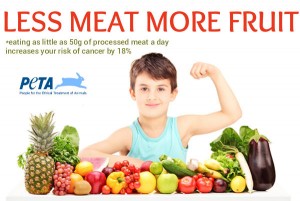
I created this new PETA advertisement to accurately illustrate the organization’s views on meat consumption, and to re deliver the message they were trying to sell in the original ad, only without the misleading and ill-informed information regarding cancer development. By including a bold red heading reading “less meat more fruit,” and having a sub heading clarifying the problematic concerns of consuming processed meats, the focus narrows in on the more fundamental message: that children should consume a variety of fruits and vegetables on a daily basis as a contributor to their physical health. To exemplify the significance of this notion I included a healthy and fit boy standing in front of a plethora of plant based foods. Unlike the original ad of a little boy smoking, this advertisement produces the message of what a child should eat instead of what they should not. In contrast to the advertisement of the boy smoking a cigar, this new advertisement does not compare meat consumption to any other carcinogenic substances, as there is no conclusive evidence that eating meat is as lethal as the intake of tobacco. I wanted to include the smaller sub heading that mentions the risks involved with eating processed meat; however, I wanted to make it as specific as possible so as to not mislead the public with false information. Also, I aimed to incorporate as many colours as possible, as this is a strategic way to draw people’s attention to the advertisement. I believe this new PETA announcement to be more informative, playful, attention grabbing and direct.
